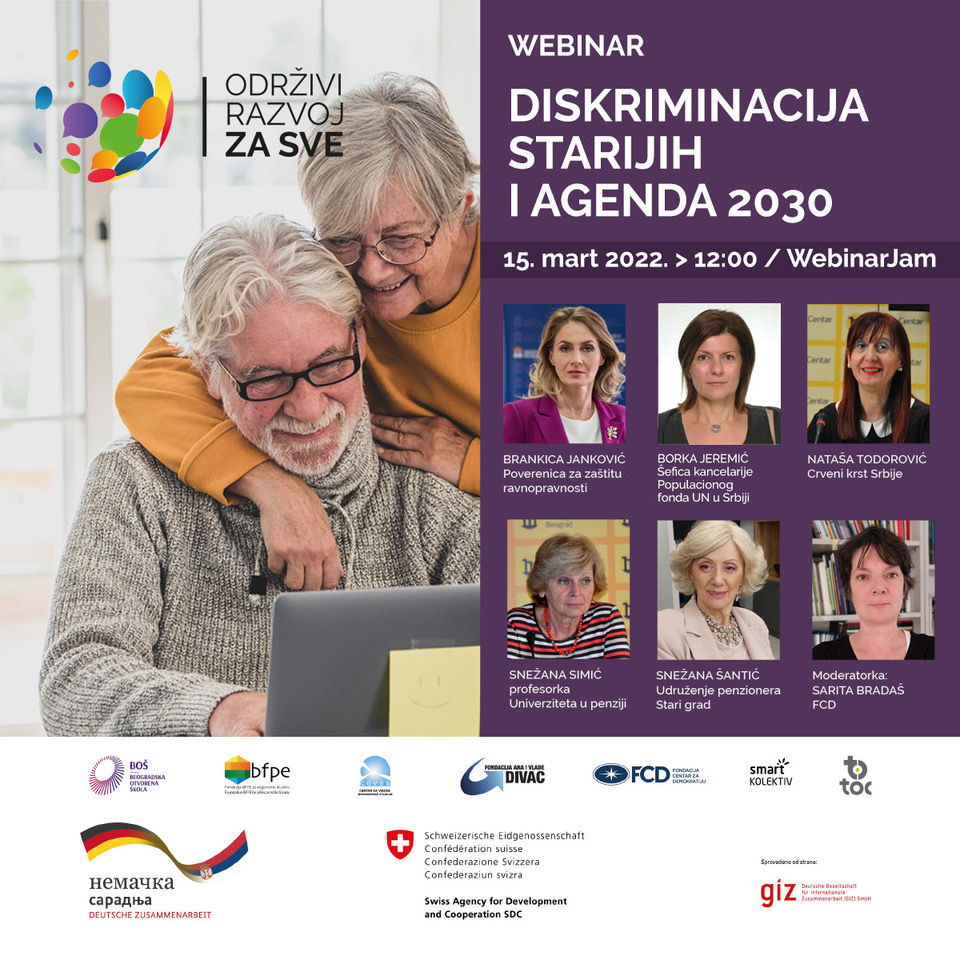Debate on Discrimination against Older Persons and the 2030 Agenda

The debate on „Discrimination against Older Persons and the 2030 Agenda“ was held on 15 March 2022, organized by the Centre for Democracy Foundation, and within the Social Pillar of the „Sustainable Development for All“ Platform.
In addition to Nataša Todorović from the Red Cross of Serbia, the participants were: Brankica Janković (Commissioner for Protection of Equality), Borka Jeremić (Head of the United Nations Population Fund Office in Serbia), Snežana Simić (retired University professor), Snežana Šantić (Association of Pensioners Stari grad). The discussion was moderated by Sarita Bradaš (Centre for Democracy Foundation).
Discrimination against older persons was discussed in the context of the implementation of the 2030 Agenda for Sustainable Development, relying on one of the most important principles of the Agenda – leave no one behind (LNOB).
Nataša Todorović spoke about intergenerational solidarity and healthy aging from the perspective of a life course. It is important to emphasize that preparing for an aging population is key to achieving the goals of the 2030 Agenda and that aging should be seen as a horizontal issue reflected in a series of SDGs (Sustainable Development Goals): poverty eradication, good health, gender equality, lifelong learning, economic growth and decent work, reducing inequality, sustainable cities…
Older persons have the right to financial security, it is necessary to provide a minimum income and adequate accommodation in order to enable a dignified life. We must remember that 8% of men and 17% of women aged 65 and over do not receive any pension, and that there is also a gap in pensions between women and men, which is reflected in the systematically lower pensions received by women. A dignified old age does not exist without a minimum of financial security, because with age, incomes decrease and health care costs increase, costs that are necessary to meet basic living needs. The lack of a secure minimum income can push older persons and their families into poverty.
For older persons, in addition to financial security, health care is also important. Health care services should be accessible and accessible to all, but during the COVID-19 crisis there were huge problems in accessing regular health services globally, both in terms of physical accessibility because most resources were focused on the fight against COVID-19, and in terms of economic affordability which included having to pay for services. It is also important to ensure the right of older persons to long-term care is exercised, through the integration of health and social services.
In light of the decade of healthy aging, it is necessary to promote healthy aging throughout the life cycle, reminding us that it is never too early or too late to start investing in healthy aging.
In order to ensure the realization of the 2030 Agenda, greater involvement of older persons in society and the opportunity to have their voices heard is needed. We may have an additional pair of robotic arms with the development of digital technologies, and this may make it easier for us to provide care services, but we will still be responsible for taking care of our parents as they took care of us.
Video of the webinar: https://youtu.be/ZTANA2SRuH4
